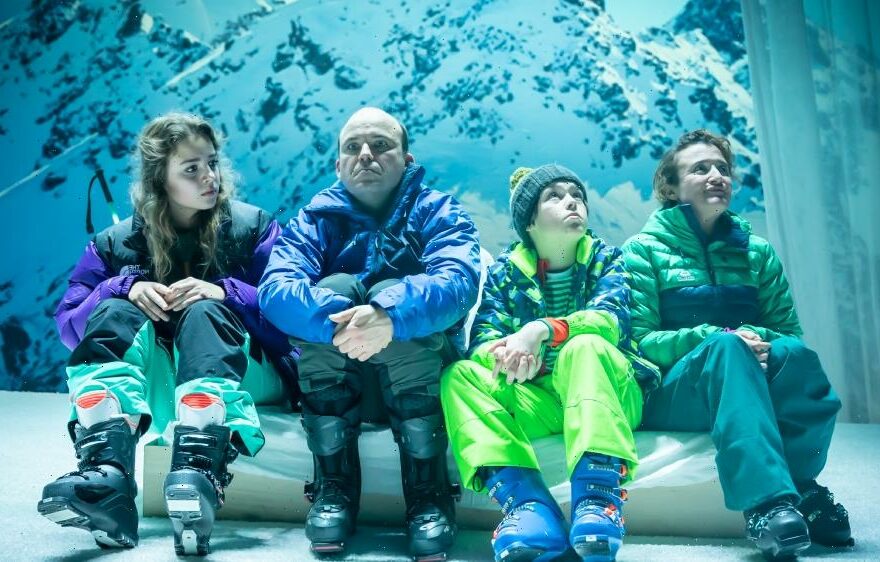No one stages something set across mountainous ski slopes in a 251-seat, three-sided theater without a sense of humor. Which is why director Michael Longhurst has attached the bold and perky theme tune to “Ski Sunday,” the BBC’s long-running weekly winter sports series, to the end of his stage production of Cannes Jury Prize winner “Force Majeure,” since it majors in both those qualities. Can the play, now running at London’s Donmar Warehouse, emulate the film’s scale and spaciousness? Of course not. Does it succeed on its own bold and perky terms? Just.
In Tim Price’s adaptation, the story remains largely the same. In this drama of a middle-class family on skis and on the skids, Rory Kinnear and Lyndsey Marshal are Thomas and Ebba who have taken their two squally children away to the French alps. It’s supposed to be a snowy vacation from everything but it turns out to be a million miles away from “Holiday on Ice.”
When not quarreling on the slopes, the kids are on their devices while the parents are playing, with increasing amounts of strain, at happy families. So far, so predictable — until, one lunchtime high up in the ski-resort, the regular, controlled snow-shifting goes perilously wrong.
In something of a design triumph, set designer Jon Bausor, lighting designer Lucy Carter and sound designer Donato Wharton chill the audience by filling the auditorium with the thundering chaos of an avalanche. Faced with fatality, Thomas and Ebba react very differently, causing the fissure in the marriage to widen into a cavernous gap. All of this happens within the sight of not only the long-suffering hotel staff but the assorted après-ski crowd who punctuate proceedings in suitably day-glo outfits as bold as their attitudes to fun.
Ideally closed-off Kinnear and especially a riveting, tether’s-end Marshal are alive to every tiny shift in their cracking relationship which, by the intermission, has gradually steeped everything more in darkness than light. But although Longhurst and company keep tight focus on the increasingly painful family dynamics as both parents face previously hidden truths, they’re alive to the comedy of the situation. All this is brought to a head after way too much wine in Marshal’s blissfully played, drunken truth-telling.
Although the stakes climb higher in the second half, so does the humor, not least via the parallel relationship between Thomas’s friend Mats (Sule Rimi) and his new girlfriend Jenny (Siena Kelly). Their crisply directed, deliciously ridiculous, through-the-night row, in which Mats’ ego goes into comic overdrive, is a very funny counterbalance to the deeper rift between the parents.
The loss of the film’s epic visuals that offset the uncovered emotions is undeniable. But the creative team, not least movement director Sasha Milavic Davies via Bausor’s cunning, snow-white and severely tilted set, winningly pulls off the feat of having cast members ski down slopes in front of the audience’s ready-to-disbelieve eyes.
The theatrical gain is in the degree of emotional complicity. Being just feet away from Thomas as he attempts to get in touch with his feelings makes you wince, while the collective laughter raised by the entitled behavior of the children (ideally truculent Florence Hunt and Henry Hunt at the performance reviewed) builds warmth towards the fracturing family.
Not everything works. The staging of a climactic act of family healing on the slopes, while nicely comic, requires a hefty suspension of disbelief, and the final neat switch from the film’s coach journey-from-hell into an elevator disaster is a shade effortful.
Fans of the film may feel a bit short-changed, but the success of this theatrical version is clear from the warmth of the response to the unfashionable yet welcome happy ending.
Source: Read Full Article
